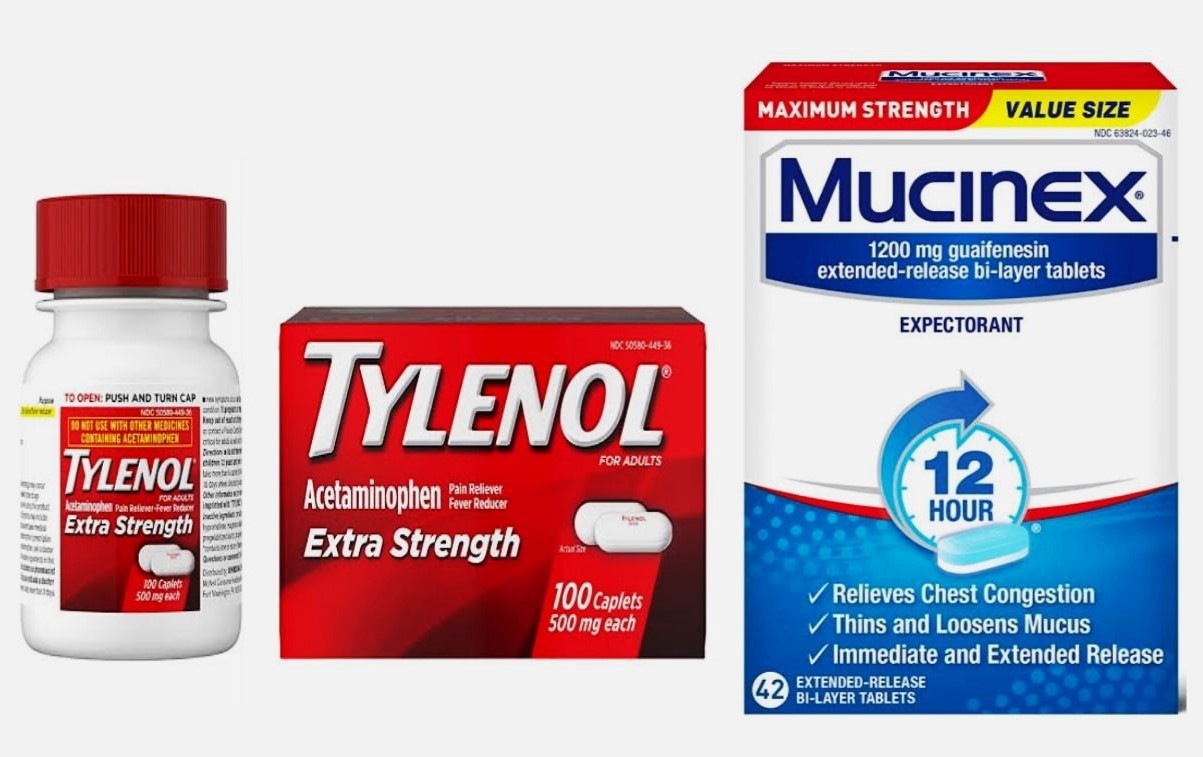Home>Health and Wellness>The Ultimate Combo: Tylenol And Mucinex – What You Need To Know!


Health and Wellness
The Ultimate Combo: Tylenol And Mucinex – What You Need To Know!
Modified: March 3, 2024
Learn about the ultimate health combo of Tylenol and Mucinex, including their benefits and precautions. Stay informed for better health and wellness.
(Many of the links in this article redirect to a specific reviewed product. Your purchase of these products through affiliate links helps to generate commission for Noodls.com, at no extra cost. Learn more)
Table of Contents
Introduction
When it comes to battling the discomfort of cold and flu symptoms, finding the right combination of medications can make all the difference. Two commonly used over-the-counter medications, Tylenol and Mucinex, have gained popularity for their effectiveness in addressing various symptoms associated with respiratory infections. Understanding how these two medications work individually and in combination is crucial for achieving relief while ensuring safety.
In this comprehensive guide, we will delve into the mechanisms of Tylenol and Mucinex, explore how they complement each other, and highlight the potential risks and side effects of using them together. By the end, you'll have a clear understanding of when and how to safely use the ultimate combo of Tylenol and Mucinex to combat cold and flu symptoms effectively. So, let's embark on this journey to uncover the power of this dynamic duo!
What is Tylenol?
Tylenol, also known by its generic name acetaminophen, is a widely used over-the-counter pain reliever and fever reducer. It belongs to the class of medications known as analgesics and antipyretics. Tylenol is a go-to remedy for various ailments, including headaches, muscle aches, arthritis, and toothaches. It is also commonly recommended for reducing fever associated with colds and flu.
Unlike nonsteroidal anti-inflammatory drugs (NSAIDs) such as ibuprofen and aspirin, Tylenol works by targeting the brain's hypothalamus, which regulates body temperature and pain. By inhibiting the production of prostaglandins in the brain, Tylenol helps to lower fever and alleviate discomfort without possessing anti-inflammatory properties.
One of the key advantages of Tylenol is its relatively gentle effect on the stomach compared to NSAIDs, making it a preferred choice for individuals with sensitive stomachs or a history of gastrointestinal issues. However, it's important to note that Tylenol should be used cautiously, especially in cases of liver disease or when consuming alcohol, as excessive use can lead to liver damage.
In addition to its standalone use, Tylenol is often included in combination medications designed to address multiple symptoms simultaneously. These combinations can include other active ingredients such as decongestants, antihistamines, or cough suppressants, providing a comprehensive approach to managing cold and flu symptoms.
Understanding the proper dosage and potential interactions with other medications is crucial when using Tylenol. It's essential to follow the recommended dosage guidelines and consult with a healthcare professional, especially when considering its combination with other medications like Mucinex.
In the next section, we will explore the properties and uses of Mucinex, shedding light on its role in providing relief from respiratory symptoms.
Now, let's delve into the world of Mucinex and its mechanisms of action.
What is Mucinex?
Mucinex, a popular over-the-counter medication, is widely recognized for its effectiveness in addressing respiratory symptoms associated with colds, flu, and other respiratory infections. Its active ingredient, guaifenesin, is an expectorant that works by thinning and loosening mucus in the airways, making it easier to cough up and clear the respiratory passages. This action helps alleviate chest congestion and makes breathing more comfortable for individuals experiencing respiratory distress.
Unlike decongestants, which work by narrowing blood vessels to reduce swelling in the nasal passages, guaifenesin targets the mucus itself, promoting its expulsion from the respiratory tract. This unique mechanism of action sets Mucinex apart as a valuable tool in managing respiratory symptoms, particularly those involving thick, stubborn mucus that can contribute to coughing, wheezing, and difficulty breathing.
Mucinex comes in various formulations, including extended-release tablets and liquid forms, allowing individuals to choose the option that best suits their preferences and needs. The extended-release feature of certain Mucinex products provides long-lasting relief, reducing the frequency of dosing and ensuring consistent mucus-thinning effects over an extended period.
Moreover, Mucinex is often combined with other active ingredients, such as decongestants or cough suppressants, in multi-symptom relief formulations tailored to address a broader range of cold and flu symptoms. This comprehensive approach allows individuals to tackle congestion, coughing, and discomfort with a single medication, streamlining the management of respiratory infections.
Understanding the role of Mucinex in targeting mucus and alleviating respiratory symptoms is pivotal for individuals seeking relief from cold and flu-related discomfort. By incorporating Mucinex into their symptom management regimen, individuals can effectively address the underlying cause of respiratory distress, facilitating a speedier recovery and improved quality of life during illness.
Now that we've explored the properties and mechanisms of Mucinex, let's delve into how Tylenol and Mucinex work together to combat cold and flu symptoms effectively.
How do Tylenol and Mucinex Work Together?
When it comes to combating the multifaceted symptoms of cold and flu, the combination of Tylenol and Mucinex can offer a comprehensive approach to addressing discomfort and distress. Tylenol, with its fever-reducing and pain-relieving properties, can help alleviate the general malaise and discomfort often associated with respiratory infections. By targeting the brain's hypothalamus to lower fever and inhibit pain signals, Tylenol provides a foundational relief that can improve overall well-being during illness.
On the other hand, Mucinex, with its mucus-thinning action facilitated by guaifenesin, directly addresses the respiratory symptoms that often accompany colds and flu. By loosening and thinning mucus in the airways, Mucinex helps individuals expel stubborn phlegm, reducing chest congestion, coughing, and breathing difficulties. This targeted approach to respiratory symptom management can significantly improve the individual's comfort and ability to breathe freely, promoting a faster recovery.
When used together, Tylenol and Mucinex complement each other's actions, providing relief for both systemic symptoms and respiratory distress. By addressing fever, body aches, and general discomfort, Tylenol sets the stage for improved comfort, while Mucinex tackles the specific respiratory symptoms that can exacerbate overall illness-related distress. This synergistic effect allows individuals to experience more comprehensive relief, addressing the diverse array of symptoms that often accompany colds and flu.
Moreover, the combined use of Tylenol and Mucinex in multi-symptom relief formulations can offer a convenient and effective approach to managing cold and flu symptoms. These combination products often integrate additional active ingredients, such as decongestants or cough suppressants, to provide a well-rounded solution for individuals dealing with a spectrum of symptoms. By streamlining the intake of multiple medications into a single formulation, individuals can simplify their symptom management while benefiting from the complementary actions of Tylenol and Mucinex.
It's important to note that while the combination of Tylenol and Mucinex can offer valuable relief, individuals should always adhere to recommended dosages and guidelines. Consulting a healthcare professional before combining these medications is essential, especially for individuals with pre-existing medical conditions or those taking other medications. By understanding how Tylenol and Mucinex work together and using them judiciously, individuals can harness the power of this dynamic duo to effectively combat the discomfort of cold and flu symptoms.
Dangers and Side Effects
While the combination of Tylenol and Mucinex can provide effective relief from cold and flu symptoms, it's important to be aware of potential dangers and side effects associated with these medications, especially when used together.
Read more: Alfani: The Ultimate Brand You Need To Know!
Tylenol:
-
Liver Damage: One of the most significant risks associated with Tylenol is the potential for liver damage when taken in excessive amounts. Overdosing on Tylenol can lead to severe liver toxicity, which may result in liver failure and necessitate emergency medical intervention.
-
Interaction with Alcohol: Consuming alcohol while taking Tylenol can exacerbate the risk of liver damage. Alcohol and acetaminophen, the active ingredient in Tylenol, can have a synergistic effect on the liver, increasing the likelihood of adverse outcomes.
-
Allergic Reactions: While rare, some individuals may experience allergic reactions to Tylenol, presenting symptoms such as rash, itching, swelling, dizziness, or difficulty breathing. It's crucial to seek immediate medical attention if any signs of an allergic reaction manifest after taking Tylenol.
Mucinex:
-
Gastrointestinal Distress: Guaifenesin, the active ingredient in Mucinex, may cause gastrointestinal side effects such as nausea, vomiting, or stomach upset in some individuals. It's advisable to take Mucinex with food or a full glass of water to minimize the likelihood of experiencing these effects.
-
Drug Interactions: Mucinex may interact with certain medications, particularly those that affect the kidneys. Individuals taking medications that impact kidney function should exercise caution and consult a healthcare professional before using Mucinex.
-
Allergic Reactions: While uncommon, allergic reactions to guaifenesin can occur, leading to symptoms such as skin rash, itching, swelling, or difficulty breathing. Immediate medical attention is necessary if any signs of an allergic reaction arise after taking Mucinex.
Combination Use:
-
Overdose Risk: When used in combination, the risk of inadvertently exceeding the recommended dosage of either Tylenol or Mucinex increases. Overdosing on either medication can lead to severe health complications and requires prompt medical intervention.
-
Liver Health Considerations: Individuals with pre-existing liver conditions should exercise caution when using the Tylenol and Mucinex combination, as both medications can impact liver function. Consulting a healthcare professional is crucial for individuals with liver disease or related concerns.
-
Consultation with Healthcare Professional: Before combining Tylenol and Mucinex, it's essential to seek guidance from a healthcare professional, especially for individuals with underlying medical conditions, a history of allergies, or those taking other medications. This proactive approach can help mitigate potential risks and ensure safe and effective use of the combination.
Understanding the potential dangers and side effects of Tylenol and Mucinex, both individually and in combination, is paramount for safe and informed usage. By being cognizant of these considerations and seeking guidance when necessary, individuals can leverage the benefits of these medications while minimizing the associated risks.
When to Avoid the Combo
While the combination of Tylenol and Mucinex can offer valuable relief from cold and flu symptoms, there are specific scenarios in which individuals should exercise caution or avoid using this combination altogether. Understanding when to avoid the combo is essential for ensuring safe and effective symptom management.
Liver Health Concerns
Given that both Tylenol and Mucinex can impact liver function, individuals with pre-existing liver conditions should approach the combination with utmost caution. Liver diseases or conditions such as hepatitis, cirrhosis, or liver damage can be exacerbated by the use of medications that affect liver function. In such cases, it is crucial to consult a healthcare professional before considering the combination of Tylenol and Mucinex. Healthcare providers can offer personalized guidance and recommend alternative approaches to symptom management that minimize the risk to liver health.
Alcohol Consumption
Consuming alcohol while using Tylenol and Mucinex is a significant concern due to the potential for liver damage. Alcohol and acetaminophen, the active ingredient in Tylenol, can have a synergistic effect on the liver, increasing the risk of liver toxicity. Individuals who regularly consume alcohol or are planning to consume alcohol during illness should avoid the combination of Tylenol and Mucinex. It is advisable to seek alternative medications or approaches to symptom relief that do not pose a risk of liver damage when combined with alcohol consumption.
Kidney Function Impairment
Individuals with impaired kidney function or those taking medications that affect kidney health should be cautious when considering the combination of Tylenol and Mucinex. Both medications can impact kidney function, and their combination may pose an increased risk to individuals with compromised renal health. Consulting a healthcare professional is vital for individuals with kidney-related concerns to determine the suitability of using Tylenol and Mucinex and explore alternative options that do not jeopardize kidney function.
Allergic Reactions
Individuals with a history of allergic reactions to either acetaminophen (Tylenol) or guaifenesin (Mucinex) should avoid the combination to prevent the risk of an allergic response. Allergic reactions can manifest as skin rash, itching, swelling, or difficulty breathing and may necessitate immediate medical attention. It is imperative for individuals with known allergies to these medications to seek alternative symptom management approaches that do not pose a risk of triggering an allergic reaction.
By being mindful of these considerations and understanding when to avoid the combination of Tylenol and Mucinex, individuals can prioritize their health and well-being while seeking alternative approaches to effectively manage cold and flu symptoms. Consulting with a healthcare professional to assess individual health factors and explore alternative medications or treatment strategies is crucial for making informed decisions regarding symptom relief.
Read more: Bath Fitter Cost: What You Need To Know
Conclusion
In conclusion, the combination of Tylenol and Mucinex presents a powerful synergy in addressing the multifaceted symptoms of cold and flu. Tylenol, with its fever-reducing and pain-relieving properties, provides foundational relief from general discomfort and malaise, while Mucinex, through its mucus-thinning action facilitated by guaifenesin, directly targets respiratory symptoms, such as chest congestion and coughing. When used together, these medications complement each other's actions, offering comprehensive relief for systemic symptoms and respiratory distress.
However, it is crucial for individuals to be aware of potential dangers and side effects associated with Tylenol and Mucinex, especially when used in combination. Risks such as liver damage, gastrointestinal distress, and potential drug interactions underscore the importance of using these medications judiciously and under the guidance of a healthcare professional.
Furthermore, specific scenarios, such as pre-existing liver conditions, alcohol consumption, impaired kidney function, and allergic reactions, warrant caution or avoidance of the Tylenol and Mucinex combination. Understanding when to avoid this combination is essential for ensuring safe and effective symptom management, prioritizing individual health and well-being.
Ultimately, individuals seeking relief from cold and flu symptoms should approach the combination of Tylenol and Mucinex with a proactive mindset, seeking guidance from healthcare professionals, adhering to recommended dosages, and being mindful of potential interactions and risks. By doing so, they can harness the benefits of this dynamic duo while minimizing potential adverse effects.
In navigating the realm of cold and flu symptom management, knowledge, caution, and informed decision-making are invaluable allies. The combination of Tylenol and Mucinex, when utilized with prudence and understanding, can serve as a valuable tool in the arsenal against the discomfort of respiratory infections, contributing to improved well-being and a smoother path to recovery.












